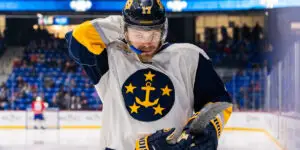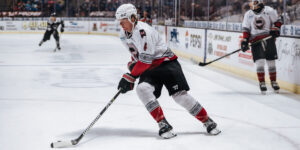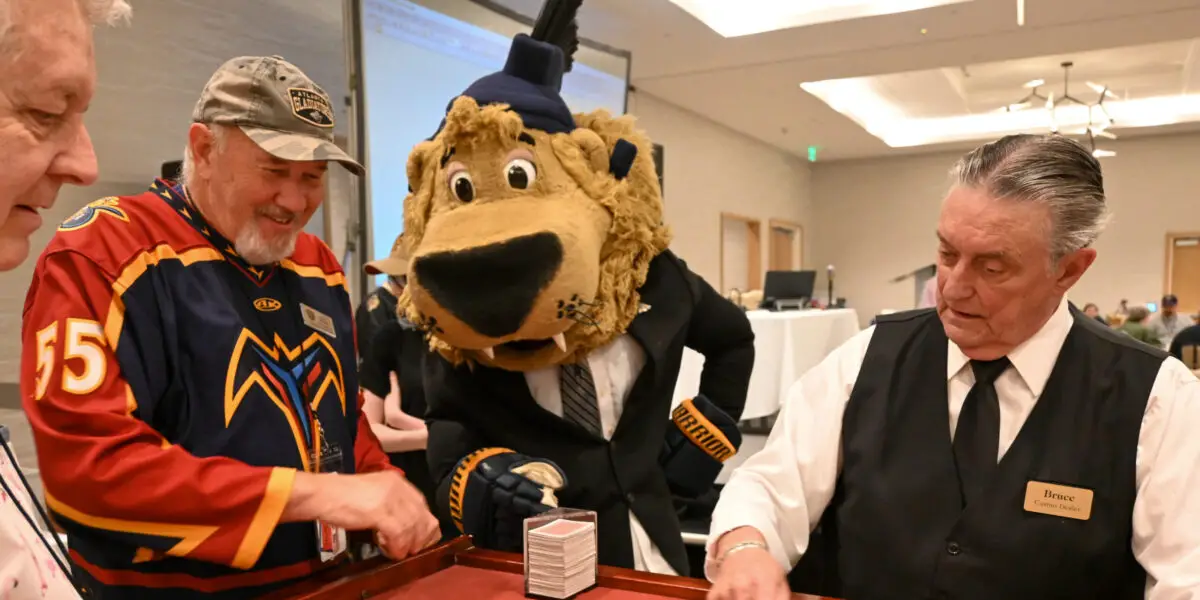
Fans play a major role in the lower levels of professional hockey—especially in the ECHL and SPHL. One of the best examples of that passion is the annual “Jamboree,” where Booster Clubs from both leagues come together to connect and celebrate. In 2025, the Atlanta Gladiators Booster Club hosted the event at The Westin Atlanta/Duluth, and I had the privilege of attending to experience the ECHL/SPHL Jamboree firsthand.
The Jamboree brought together a passionate group of fans and supporters across multiple leagues. Attendees included Booster Clubs representing the Atlanta Gladiators, Athens Rock Lobsters, Birmingham Bulls, Cincinnati Cyclones, Elmira Jackals (2007-2017), Evansville Thunderbolts, Fayetteville Marksmen, Florida Everblades, Greensville Swamp Rabbits, Huntsville Havoc, Kalamazoo Wings, and Roanoke Rail Yard Dawgs. This diverse mix of teams highlighted just how strong and widespread the Booster Club community has become, uniting fans who give their time, energy, and heart to the sport they love.
Booster Clubs started as grassroots groups formed by fans who wanted to support their teams beyond just cheering from the stands. Over time, many grew into organized nonprofits that now serve as an essential part of the team community. They help players and their families with housing, meals, airport rides, and support throughout the season. Booster Clubs often host banquets, run charity drives, and organize family-friendly events that strengthen the connection between the team and its fans.
What Happens at Jamboree
The annual Jamboree offers more than just a chance to connect. It includes presentations, games, and opportunities for Booster Clubs to review, revise, and renew their bylaws. It’s a valuable time for clubs to share ideas, build relationships, and create lasting memories. This year marked a milestone, as the event welcomed its first-ever FPHL team: the Athens Rock Lobsters.
For the past two years, ECHL Booster Clubs have hosted the Jamboree, with Worcester serving as the host city in 2024. In 2026, the event will shift back to the SPHL, with the Roanoke Rail Yard Dawgs taking on hosting duties. The Huntsville Havoc are set to host the Jamboree in 2027. Clubs earn hosting rights through a bid process—interested groups present proposals, and attendees vote to select the next location.
Hosting a Jamboree requires a significant investment of time and resources, reflecting the deep dedication of these fan-driven organizations. Their commitment goes beyond supporting their teams—they help strengthen the sport’s foundation and ensure its future through community and collaboration.
Derek Nesbitt’s Tribute to the Boosters
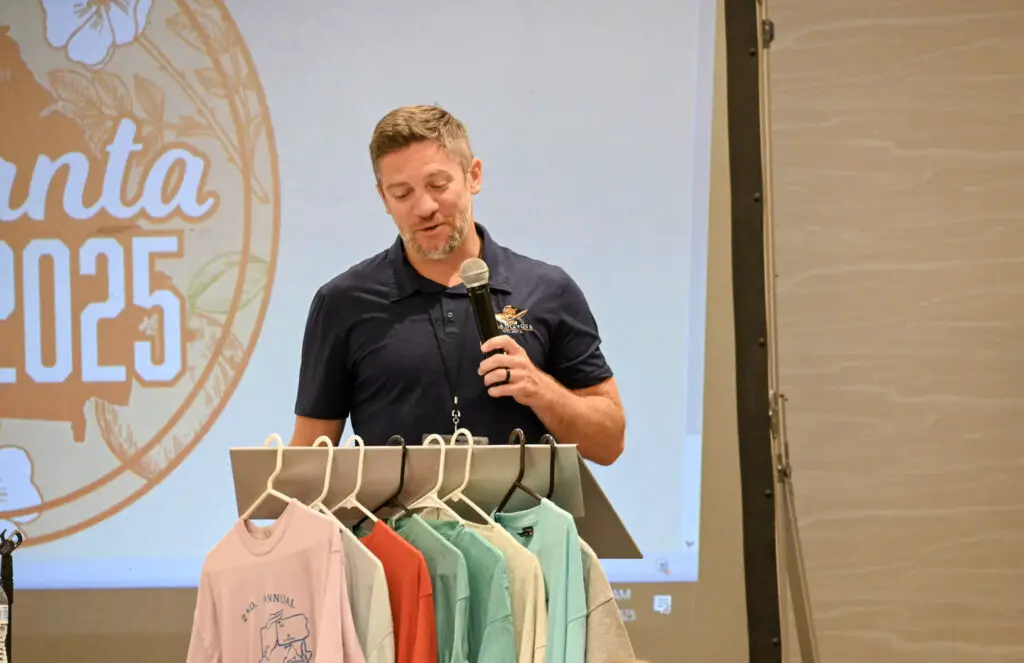
Former Atlanta Gladiators captain and current front office member Derek Nesbitt delivered a heartfelt speech that underscored just how much the Booster Club community has meant to him, both on and off the ice.
He reflected on his early playing days, sharing how Booster Clubs were more than just behind-the-scenes helpers—they formed the heart of the team. Nesbitt recalled his first experience with the tradition at a crawfish boil in Shreveport, where the warm, welcoming atmosphere left a lasting impression. That same spirit followed him throughout his career, but it was his years in Atlanta that truly brought everything full circle.
“I’ve always made a point to tell our guys—when I was playing, when I coached, even now—give back to them, because they’re going to give back hell of a lot more. And we do need that. It is a lot of help,” Nesbitt said.
He also shared a personal moment from the 2019–20 season: the ECHL allowed players to wear custom names on their jerseys for a special auction. Nesbitt chose to wear his son’s name, Declan Graham, on the back. Wanting to preserve the memory, he coordinated with the equipment manager to wear two jerseys so that they would be able to auction one and he could keep another. One of those jerseys was won at auction by longtime Booster Casey, who had fiercely bid on it, only to turn around and hand it back to Nesbitt after he won the auction. Nesbitt made sure that Casey got one of those jerseys, too.
“First thing he did—he goes and gets a picture with us—and then he said, ‘Well, this is yours.’ I said, ‘No. This is yours. Now you get to keep it too.’ He starts crying, I’m crying… That’s what this community does.” – Derek Nesbitt
Perhaps the most touching part of his speech came when Nesbitt reflected on the late Mike Johnson, a founding member and former Booster Club president who passed away from pancreatic cancer in 2010. It was at Mike and Juanita’s home, after the funeral, that Nesbitt would meet his future wife.
“Maybe this is an odd way of meeting someone, but… they invited everyone back to their house after [the funeral]. Little did I know I would actually meet my wife at their house. Nesbitt paused, and then after a moment said, “It’s amazing how much you guys do for people.”
Nesbitt’s remarks were a powerful reminder of the lasting relationships and quiet acts of generosity that define the Booster Club community. Long after the final buzzer, it’s the people behind the scenes who keep the spirit of the game alive.
What Do The Booster Clubs Do?
The minor league hockey schedule can be tough, especially depending on the hand some teams are dealt. Booster Clubs often step up in quiet but meaningful ways—packing snacks, providing bus blankets, and helping players get through long road trips with a little extra comfort and care.
It’s not uncommon for home teams to receive post-game meals from Booster Clubs, a tradition embraced across many teams and leagues. Providing food after games is just one of the many ways Booster Clubs support their players beyond the ice.
“If the Boosters ever ask you to come to an event they’re putting on and there’s food there, you make sure your ass is there. I learned this really quick in Shreveport when I was invited to a crawfish boil—oh man—second night there, and I don’t know if I was quite ready for that yet, coming from the North. But man, did they put on a spread.”
Derek Nesbitt, Former Head Coach and Director of Community Engagement
One of the things some Booster Clubs help with is organizing Parent Weekend. During this annual event, they may assist with transportation to and from the airport and take players’ parents out to dinner. Some teams also help arrange rides for players traveling to and from the airport during the season. When the team is travling, a few Booster Clubs will even host girls’ nights for the players’ wives and girlfriends. These events reflect how passionate Boosters are about supporting not just the players, but their families as well.
Comparing ECHL and AHL Booster Clubs
Booster Clubs in both the ECHL and AHL share the same core mission: supporting players, families, and strengthening the connection between fans and the team. Each relies on dedicated volunteers to organize events, provide player support, and fundraise through activities like raffles, team dinners, and community drives. In the ECHL, Booster Clubs often operate in smaller markets where relationships between fans and players are more personal and hands-on. These clubs tend to be more grassroots, with flexible structures and closer access to the team. In contrast, AHL Booster Clubs are typically more formal, sometimes operating as registered nonprofits, and often function within larger, more structured environments.
Due to their proximity to NHL affiliates, AHL teams may have tighter regulations that limit fan interaction, and players may receive more support through the organization itself. Meanwhile, ECHL players, who often move between teams, frequently rely on Booster Clubs for immediate, practical help. Despite these structural differences, both types of clubs play a vital role in uplifting their teams and creating a sense of community rooted in a shared love for the game.
How To Get Involved/Start A Booster Club
Starting a Booster Club for a hockey team begins with securing support and approval from the team’s staff to ensure that the club’s goals align with the organization’s expectations. From there, a small group of dedicated fans, parents, or community members can form the foundation of the club. It’s important to define a clear mission. Whether focused on supporting players, families, or the overall fan experience, and to decide whether the club will operate informally or pursue nonprofit status.
Key steps include drafting bylaws, opening a bank account, promoting membership, and organizing fundraisers. They also discussed events such as raffles, team dinners, or care package drives. For those unsure where to begin, many existing Booster Clubs are happy to offer guidance and share best practices. One of the biggest takeaways was the genuine sense of community. Each club is deeply committed to the shared mission of supporting its teams and helping fans connect with the sport.
“The people truly have become hockey family. I’ve been lucky to be brought up in Worcester hockey but to now have people all over the ECHL/SPHL as well has been such a blessing.”
Donna Ahasey, Worcester Railers Booster Club
During the Jamboree, clubs are honored with special awards, including the President’s Cup, which this year was presented to the highest-playoff-ranked ECHL team in attendance—Florida, closest to winning the Kelly Cup—and the Vice President’s Cup, awarded at the SPHL level to Evansville Thunderbolts as the top playoff-ranking SPHL club in attendance. These symbolic trophies help highlight exemplary postseason achievement among attending clubs, reinforcing the competitive spirit and camaraderie shared at the annual Booster Club gathering.
A Call to Make a Difference: President Jared Youngman
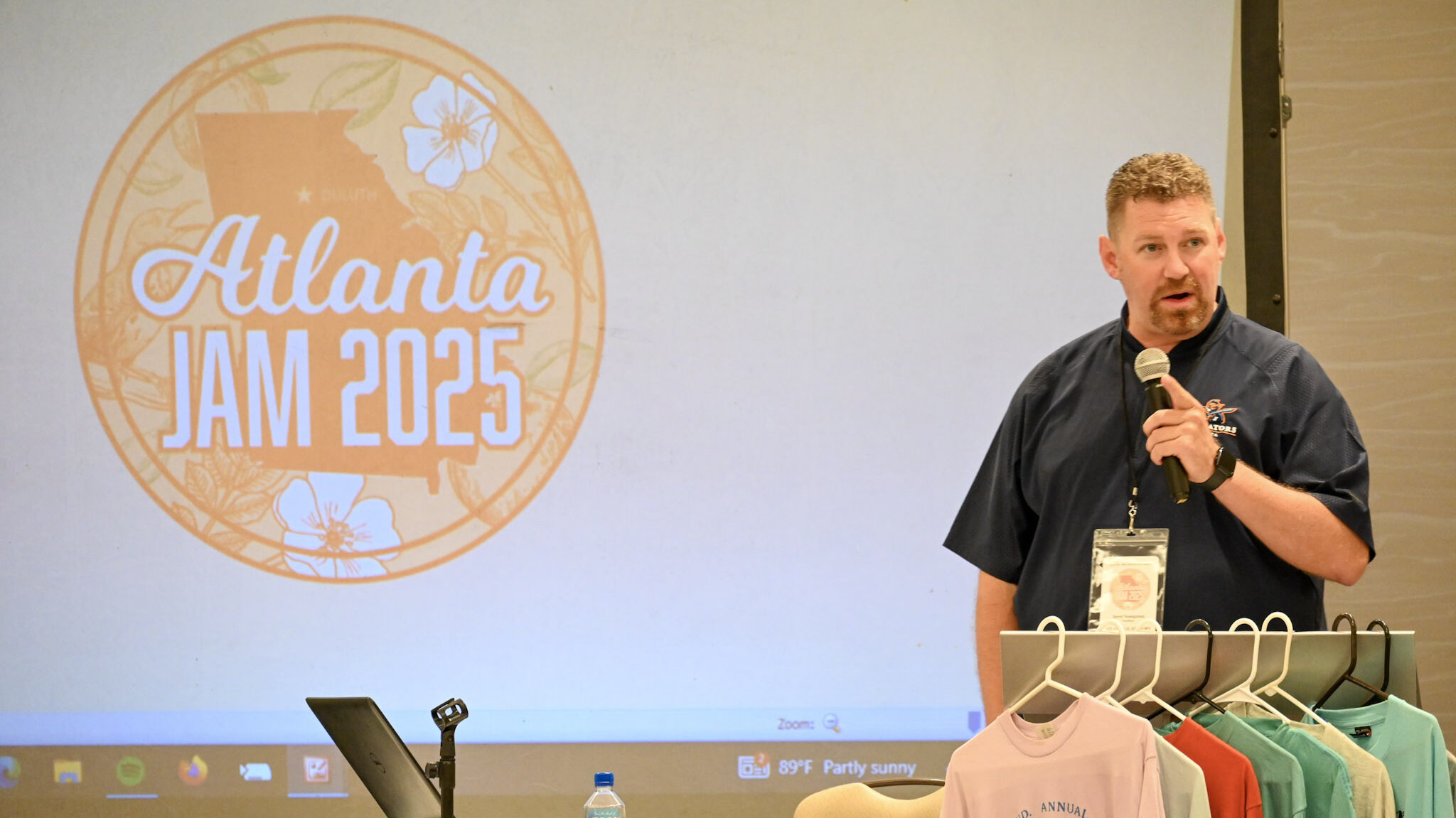
Atlanta Gladiators President Jared Youngman stood before the room and offered a message that wasn’t about standings or scoreboards; it was about people. One story in particular stayed with every person who heard it.
Jake, a young man with developmental challenges, had been publicly mocked while cheering at a Utah Jazz game. When Jared saw a Facebook post from Jake’s sister describing what happened, he knew he wanted to do something.
“I know I’m not the Utah Jazz,” Jared told her, “but I would love to do something for Jake.”
So he did. Jake was invited to a hockey game with six front-row seats on the glass—Jared’s own. Youngman sent more than 200 additional tickets for his friends, family, and community. Jake had no idea what was planned. Jake was welcomed by name and presented with a customized jersey that read Jake the Snake. He was also invited onto the ice for his own moment in the spotlight.
Nervous to go alone, Jake asked if Jared’s daughter would walk with him.
“Here’s Jake and Ash, they’re walking out hand in hand. Crowd erupts for Jake.”
That night wasn’t a one-time event—it changed everything. Jake kept coming to games. He was given a staff badge. He found a home in the rink and a place in the organization. And at every game, one request remained constant: the music.
“‘Hey, are they going to play my song today?’ Yeah, Jake—we make it work.”, Youngman said.
Jake’s song, “Fight Song” by Rachel Platten, became a fixture in the arena. So did Jake.
Youngman shared other stories too—of a child who had been abused and found healing through hockey, of a military jersey auction that ended with a stranger giving away a jersey for free when a grieving father couldn’t afford it. Each story came back to the same message: what we do matters.
Youngman told the crowd, “Everything we do makes a difference. Everything you do makes a difference.”
Youngman spoke candidly about leaving his previous role in Utah to join the Gladiators—and how the Atlanta Booster Club, staff, and team embraced him and his children without hesitation. For someone whose kids had grown up in the rink, that welcome made all the difference.
Closing Statement
He closed his speech the way he starts each season—with a challenge:
“Make a difference. Whether it’s a player in need, whether it’s the team that’s in need, whether it’s a fan—make a difference. Because it’s those differences… they’re going to make it or break it.”
And with a quiet nod to the friendships, memories, and people that define the game beyond the ice, he reminded the room:
“This truly is the greatest game in the world.”
From honoring veterans to building friendships with fans who become family, Jared Youngman’s message echoed what every Booster Club already lives: that the most incredible power in hockey isn’t in goals or wins—it’s in the people. And it’s those people who make this game the greatest in the world.
Karen Zehner’s Role as a Writer, Author, and Booster
As someone who’s watched this community from both the inside and the press box, I’ve realized just how rare it is to find someone who fully lives in both worlds. That’s precisely what Karen Zehner does. She’s not just an ECHL writer for Inside the Rink or the author of several hockey-inspired books—she’s also a deeply committed member of the Atlanta Gladiators Booster Club.
Karen’s love for sports started early, shaped by quiet beginnings and the steady influence of her mom.
“I was really quiet and painfully shy as a kid—still am. My mom put me in cheerleading back then, hoping I’d come out of my shell, especially after we moved from Maine to Pennsylvania,” she said. “Instead, I ended up arguing with the cheer coaches about what plays were being called and which cheers we were doing. One time our coach called an offensive cheer, and I said, ‘I’m not doing that.’ She asked me why, and I said, ‘Because the defense is on the field.’ I didn’t just want to cheer—I wanted to understand the game. I watched the coaches, the players, and how the plays were called.”
She smiled before adding:
“It’s because of my mom and her love of sports that I’m doing everything I do now.”
That foundation carried into adulthood, where she now balances her roles with intentional care—and a deep sense of integrity.
“One thing that I’ve always tried to do is make sure I write about the team fairly,” she explained. “So a lot of times when I’m helping out with the Booster Club, I kind of tend to stay off to the side or by myself because I want the players to be able to have that time with the people who have worked so hard to put those potlucks together and to do all those events and make sure that they’re supported. I don’t want the team ever to feel like I’m trying to be intrusive or take advantage. I try to make sure that I keep those things clearly defined.”
That balance becomes even more impressive when you hear about the pace of her game nights. One example stood out from the 2023–24 season.
“It was Star Wars Night,” Karen said. “I had to drop off all my stuff for the potluck, did a pregame interview with one of the players, then went on to help with Star Wars Night as a handler for R2-D2 during intermissions, helping fans take pictures with him. After that, I’d run back up to the press box to cover the game and finally helped clean up after the postgame potluck. It usually takes me about an hour to get to and from the arena from Woodstock, so I started that day around 2:00 in the afternoon and didn’t get home until about 1:00 in the morning. And I wouldn’t trade it for anything.”
She also acknowledged the emotional tug that comes with covering the team she cares so deeply about.
“Writers start as fans. we love and support the teams we cover,” she said. “But when we’re at the games, we must ensure we do everything fairly and professionally. Still, you can bet when I’m sitting in my car on the way home, driving back to Woodstock after a win, I’m going, ‘Hell yeah, that was an awesome game.’”
That’s the kind of behind-the-scenes dedication most people never see. It’s also precisely what makes this level of hockey so special. It is the ones who don’t just talk about it, or write about it, but quietly support it any way they can.
Zehner’s work as a writer shines a spotlight on the heart of the sport, not just the stats. Through her articles, interviews, and poetry, she captures what it means to belong to something bigger than yourself—to a team, a town, and a tradition of giving back. Whether she’s writing from the press box or unpacking snacks in the Booster room, she shows what it truly means to support hockey in every sense of the word.
More Than a Gathering
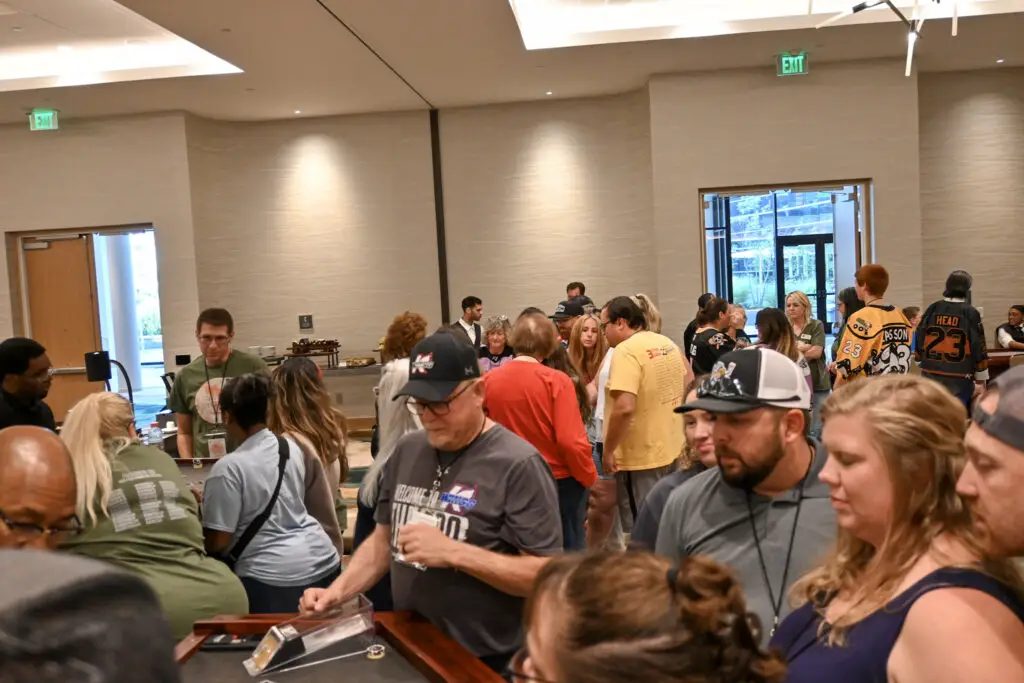
At its core, the Jamboree wasn’t just about bylaws, ideas, or planning. It is about connection. The weekend was packed with fun, from Music Bingo and Casino Night to photo booths and laughs with Maximus, the Atlanta Gladiators mascot. Beneath the laughter and late-night stories, something deeper began to take hold. By the time everyone said goodbye, it was clear the event meant more than Booster Club business. It was about the people behind the scenes. The ones who show up early, stay late, and cheer with everything they’ve got. They love this game in a way that never fades. Everyone walked away with a renewed sense of purpose and community. Hockey isn’t just a sport—it’s a family. And we’re lucky to be part of it.
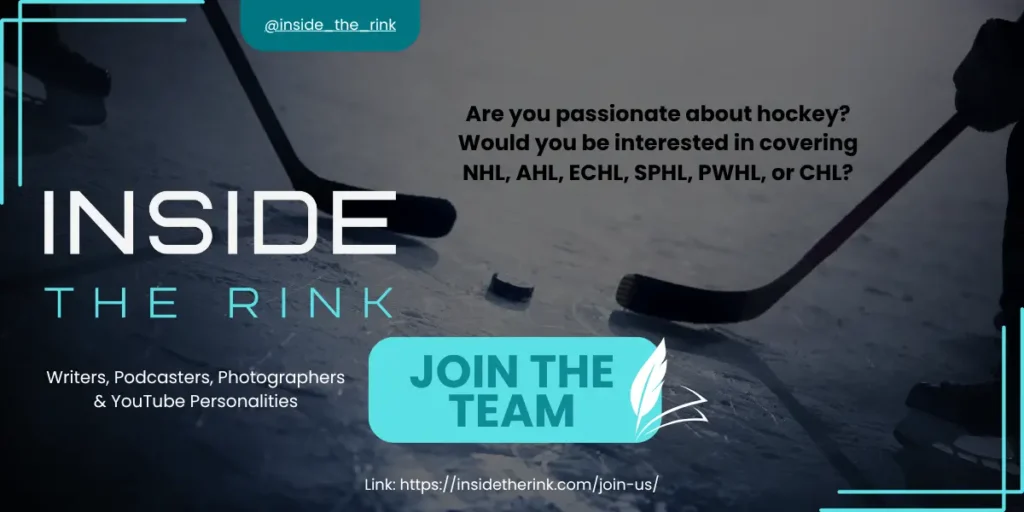
Discover more from Inside The Rink
Subscribe to get the latest posts sent to your email.

